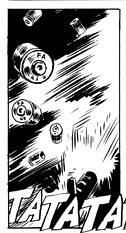
A big chunk of the last two days has been dedicated to tearing through a couple volumes of Enrique Sanchez Abuli and Jordi Bernet's TORPEDO 1936, which has been such a pleasure in part because of the book's sheer nastiness and pitch black humor. TORPEDO is a Spanish comic, and began publication in 1981, running through the late 90's (I believe-- not 100% on the end of its run). The book takes place in the New York of 1936, following a Sicilian immigrant named Luca Torelli (not to be confused with Rhapsody guitarist Luca Turilli) a.k.a. Torpedo, who has found his calling in the new world as a hired killer.
That's about it. There is not a lot of genesis to his character, or variation to his exploits. Torpedo takes a job, figures out a clever way to kill his target, sometimes kills the guy who hired him, and once in a blue moon gets outwitted. Torpedo is not a hero, nor is he an antihero. He has no hint of a conscience, and has no prospects of redemption. A pure motherfucker. He kills for money, he kills for revenge, and sometimes kills for a punchline. He abuses his partner, Rascal, and takes advantage of women. Sometimes he rapes them. In one episode, he shoots a priest, splashes his face with holy water, and steals the alms box on the way out. In another ("The Tip Off", one of my favorites), Torpedo pretends to spare a target who has renounced his life of crime and is shipping off to fight Franco, then shoots him in the back as he goes toward his train.
The nihilism of the series was intense enough to drive off its original artist, the legendary Alex Toth, after two installments. However, it is my claim that the function of art is not the instruction of ethics, and the real question is what can be gathered from a story with an irredeemable protagonist.
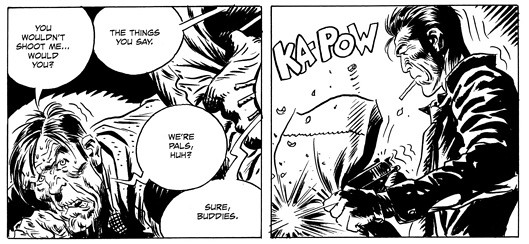
A way into this riddle might be to look examine Torpedo's world, his place in the social order. Torpedo is contracted by all sorts of people, rich and poor, hardened criminals as well as "upright" citizens in a jam, and is thus granted a unique mobility, moving comfortably through all social strata. He also exhibits these chameleon properties in the course of his work, frequently employing disguises-- clown, nun, cop, groom, Santa Claus-- and passing effortlessly in every role (there is a bit of Souvestre and Allain's Fantomas in him).
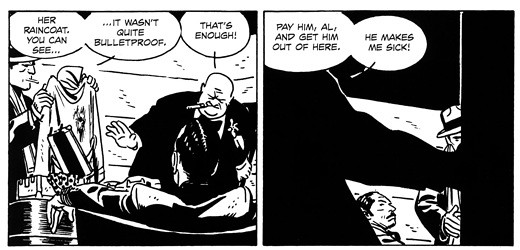
The unifying factor is that he deals exclusively with people who are at their basest states-- desperation, greed, obsession, vengeance hungry, etc.-- and these conditions permeate through every level of the social body. Torpedo is really an agent of misanthropy and malevolence, a do-er of the dirty work, a genie of secret desire. He may pass himself off as anyone and anything, but in his true form-- killer-- he is repugnant, anathema, loved by no one. Indeed, he is a dangerous figure, not just for his tendencies toward bloodshed. He is evidence of a social undercurrent that undermines the mythology of the social order (ethical, just, evolved, enlightened, Land Of Opportunity) but is necessary for that social order in practice (savage capitalist, commodity reductive).
The brilliance of Jordi Bernet's pulpy style really comes through in these moments where the primal face of the social order is unmasked. He is an expert at conveying the mania that overtakes men on an obsessive kick, and his scenes of stylized violence give way to reveal an ugly brute intensity.
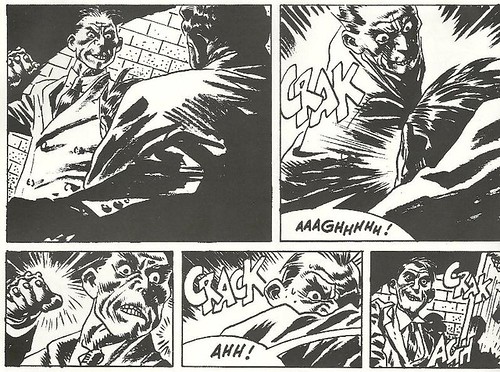
I want to say a few more words about the politics of disguise and substitution, particularly with regard to Torpedo's speech. The killer puns constantly, passing on grounds of his ostensibly bad english. "I've deformed," he tells a prison warden who inquires why he would snitch of the escape plans of his fellow prisoners. "I said I've reformed!" Torpedo's language forms a sort of shadow dialectic, drawing connections between the manners of a social order and the ugly condition beneath the signifier.
It ain't for the weak-in-the-guts, but for those interested in crime books, TORPEDO 1936 is definitely worth a look. It's currently being reprinted by IDW, who have been on a real winning streak with their crime books, also publishing Darwyn Cooke's excellent adaptations of the Donald Westlake's PARKER books (worth examining too to see the influence of Bernet on Cooke, which is clear).
This is some cold blooded shit, folks. Just the way I like it.

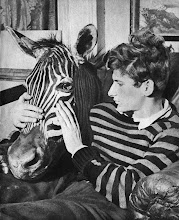



No comments:
Post a Comment